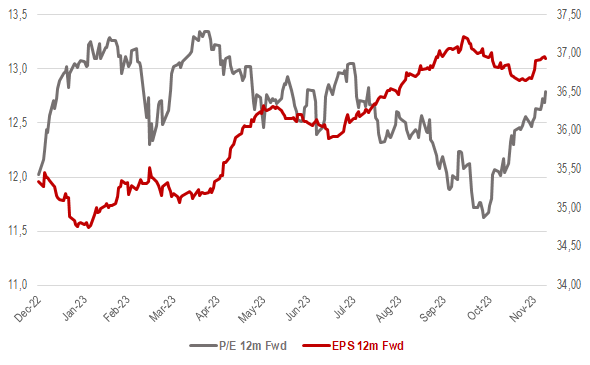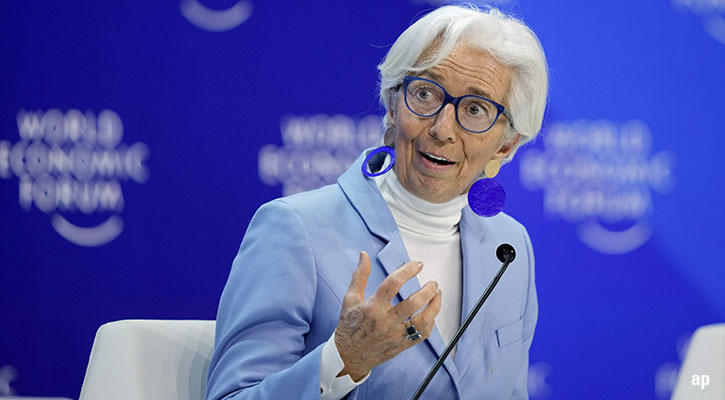.jpg)
At the end of 2022, after a year of negative performance for both equities and bonds, the base case investors had in mind entering 2023 was that there would be an economic recession.
High inflation meant more tightening from central banks, which would inevitably lead to a contraction in business activity. At some point, central banks would have to cut rates to avoid the risk of a pronounced recession.
None of that happened.
“China's reopening, large fiscal stimulus in the US and Europe and the residual strength of US consumers stabilized growth. Additional market optimism was related to ChatGPT, luxury goods, weight-loss drugs, expectation of Fed rate cuts, bitcoin rally, etc., resulting in broadly positive performance of risk markets”, Global Market strategists at JPMorgan recently wrote in a report.
As we are closing 2023 in Europe, equity markets are in better-than-expected shape. The Morningstar Europe index returned 12.9% year-to-date as of December 8, dividends included, driven by Southern countries: Italy has been the best performing market with a 30.5% rise, leading Spain's +26.5%, Germany +17.7%, the Netherlands +15.9% and France +15.1%.
Far better than feared
Growth has been far better and inflation much lower than feared, strategists at BNP Paribas wrote. The "overall picture has been one of broadly resilient economic growth," consequently, "2023 has seen equities outperforming bonds, with cyclicals outperforming, as markets have, rather controversially, climbed the wall of worry.”
The reasons behind this positive performance vary between countries. For Italy and Spain, the outperformance of large domestic banks has been a key driver as Unicredit [UCG] and Intesa Sanpaolo [ISP] gained 96% and 40%. in Spain, Santander [SAN] and BBVA [BBVA] jumped 42.9% and 58.5% respectively.
Meanwhile, Germany's DAX benchmark was buyoed by a 54% rebound of its largest constituent SAP [SAP]; while Siemens [SIE] rose 27%, Allianz [ALV] 26% and Deutsche Telekom [DTE] 26%. Together, the four blue chips account for 30% of the index.
In France, it was a rally in cyclical names, such as Air Liquide [AI], up 33.6%, Schneider Electric [SU], up 34.5%, Airbus [AIR] +26.3%, Hermes [RMS] +34%, BNP Paribas [BNP] +22%. Luxury stock L’Oreal [OR] stands out with another 33% gain.
The stock market is not the economy
One feature of financial markets in 2023 was the disconnect between how the economy and equity markets behaved.
That’s especially true for Germany. The largest European economy experienced a recession with a modest 0.4% decline in GDP, yet its stock market is among the best performing in Europe this year.
One explanation is idiosyncratic risk. Another, according to JPMorgan, is that investors “pulled money from Chinese markets and allocated them to various proxy markets such as Japan, India, Europe and US sectors seen to benefit from China”.
Both earnings estimates and valuation multiple increases drove European equity markets’ rebound in 2023.

Estimated earnings for the Stoxx Europe 600 index rose to €36.94 a share on Dec 8 from €35.34 a share at the end of 2022, a 4.5% increase, while the weighted average P/E multiple grew 6.7% to 12.8x from 12x over the same period.
Valuation multiples had a bigger impact on European equities this year as investors became more optimistic about the potential for rate cuts into 2024, thanks to slowing inflation and the perspective of a “soft landing” in the US.
Growth stocks in the lead
This environment helps explain why growth stocks continued outperforming in 2023, yet more modestly than in the past.
If we look more closely at the individual companies, stocks that enjoyed the largest increases in market value over the year were mostly growth companies. On the other hand, companies that suffered the largest declines in market value were mostly defensive names.
While 2023 was not the year most investors expected, it turned out to be a positive one for European equity investors.











.jpg)















